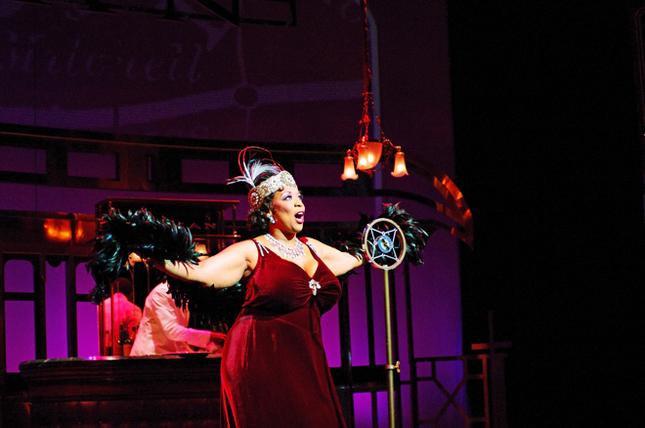‘Pullman Porter’: Great Blues Overstuffed With Melodrama
By • December 21, 2012 0 1172

The trouble with playwright Cheryl L. West’s “Pullman Porter Blues,” a world-premiere, Arena Stage co-production with the Seattle Repertory Theatre where the play with music opened, is not with the stars or any of the performers, who are almost uniformly terrific.
The trouble is neither with the fluid set, meant to convey a 1930s, depression-era train ride from Chicago to the deep South nor with the costumes. It sure is not with the music, a batch of terrific blues numbers of varying tempos performed and played with verve, gusto and honest and gut-wrenching and heart-breaking honesty by the performers.
The trouble is with West’s play, and its overambitious contents, stuffed so full with often clashing tendencies and goals that it feels both overdone and under-realized in the end. On the one hand, you have a kind of family saga, a story of three generations of Sykes men, all working as Pullman porters on a train heading south from Chicago on a day when Joe Louis fought Jim Braddock for the heavyweight boxing title of the world.
Also on board are Sister Juba and her four-man band to sing a heavy dose of blues, upbeat, downbeat, slow and dirty, wailing and loud and stuff you gotta dance to and bust a move. Add an out-and-out truly evil white conductor—the conductor being God on the Panama Limited or any other train—off-stage passengers, and a cast-off white girl teenager stowaway with the improbable name of Lutie Duggernut who has been deserted by her dad and who can play a mean harmonica.
Mind you, that’s just the setting not the plot. Faced with an opportunity to provide some meaningful drama and commentary about an ugly, but richly relevant time in America’s history in Jim Crow, segregated times, West has chosen to stoke this train ride with melodrama. It is important to remember that melodrama has its own rules that you can’t really break and its own bucket of improbabilities and coincidences and secrets.
The melodrama gets in the way of what we’re seeing and hearing: the blues, for sure, but also a picture of what it was like to live in America as an African-American, particularly an African-American man trying not just to get by like everyone else, but to get to within hollering distance of that elusive American dream — without being beaten, lynched, unjustly jailed or just ending up in a ditch. When we see that part of the play, we’re appalled, but amazed by the fortitude, the dogged courage and the inventiveness displayed by the characters and by the echoes we hear to our times: that what happens in our lives today comes from those days as surely as anywhere else.
And just when you’re ready to embrace the play at this level, along comes the melodrama and melodramatics, those long-kept secrets going back to slavery, the hopes and dreams, the ambitions and sacrifices and shameful failures.
That’s mostly about grandpa Monroe Sykes, who has made a life out of being a porter, saving money, absorbing the daily insults, giving himself respect for his efforts, followed by his son Sylvester, also a porter, who is working on getting to the future by working to create a union for the porters, a brotherhood of porters (and one of the first group organized to work for civil rights), but whose hopes are all focused on his son Cephas, whom he has managed to send to medical school. Cephas, eager, idealistic, full of life, is on this trip courtesy of grandpa Monroe, who lets him see for himself what a porter’s life is. This sets father and son and grandpa and father at odds: Sylvester is a hothead looking for trouble, Cephas is rebellious about his future, and grandpa tries to keep it all together.
Then, there’s the conductor, porter making their lives miserable, as they head south to Mississippi, played with drunken menace by Richard Ziman. There’s the band and Sister Juba who has issues and a past with Sylvester that we don’t know about. And money’s being bet on the fight, and the porters and the band are jubilant when Louis knocks out the white champion (subject of the Russell Crowe movie, “Cinderella Man”).
So what do we end up with? Performances subtle and jubilant (by Larry Marshall as Monroe), tense and fiery (Cleavant Derricks) as Sylvester, eager and appealing (Warner Miller) as Cephas and downright layered, trumpeting and triumphant (the incomporable E. Faye Butler) as Sister Julia. If “Pullman Porter Blues” were strictly a blues show, it would be just about perfect, thanks to numbers like the pounding “This Train.” the delightfully danced “Hop Scop Blues,” the somber “Trouble In Mind” and butler/sister Julia belting out “Wild Women Don’t Have the Blues.”
But there’s more to it, and here the melodrama kicks in with some potentially tragic and dangerous events that could spell serious consequences for the Sykes clan. Having found love and forgiveness together, they face the serious trouble at the end of the line in Mississippi united and together.
Here’s the problem: melodrama all but insists that the issues ahead are resolved, tragically or triumphantly, logically or emotionally. We want to know — to see what happens. The subject matter almost demands a certain ambiguity, a triumph over reality, suggesting the hope in the future.
West settles—abruptly—for ambiguity, something larger than the melodrama which we’ve been watching, a setting where danger and triumph seem to operate side by side. It’s true that you shouldn’t complain that a writer hasn’t written the play you wanted her to write. Nevertheless, you can wish in this case that West hadn’t quite so overloaded her bag of gifts with every which thing.
In the end, you’re likely to wind up fully engaged despite the play’s problems. That was certainly the case for the audience I saw at a matinee performance. It was a somewhat older audience, many of whom surely heard echoes of their own history in the music and the characters.
“Pullman Porter Blues,” will be at Arena Stage at the Mead Center for American Theater through January 6, 2013.
- The trouble with playwright Cheryl L. West’s “Pullman Porter Blues,” a world-premiere, Arena Stage co-production with the Seattle Repertory Theatre where the play with music opened, is not with the st | Kevin Rosinbum





